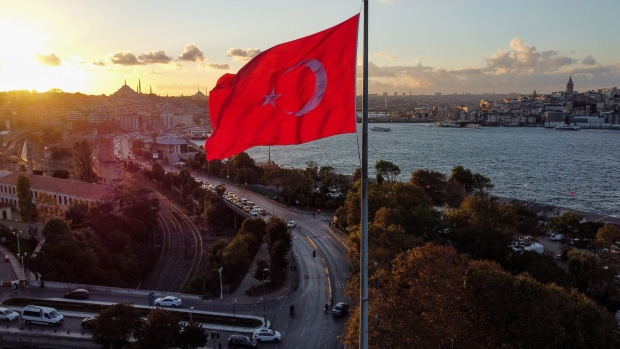Aug 12, 2022
Turkey Downgraded by Moody’s Amid Balance-of-Payments Risk
, Bloomberg News

(Bloomberg) -- Turkey’s rating was cut deeper into junk by Moody’s Investors Service as balance-of-payments risks mount and authorities struggle to stabilize the lira and restore foreign-reserve buffers.
The nation was downgraded to B3 from B2 on Friday by Moody’s, which also changed its outlook to stable from negative. The rating company pointed to odds that Turkey’s current-account deficit will probably exceed earlier expectations by a wide margin, which increases its external financing needs just as global financial conditions tighten.
“The authorities are having to resort to increasingly unorthodox measures in an attempt to stabilize the currency and restore foreign-currency buffers,” analysts Kathrin Muehlbronner and Alejandro Olivo wrote in a statement.“It is unlikely that the increasingly complex set of regulatory, fiscal and macroprudential measures will be effective in restoring some degree of macroeconomic stability.”
Moody’s estimates that the country’s current-account deficit will be close to 6% of gross domestic product this year, more than three times bigger than anticipated prior to Russia’s invasion of Ukraine.
Turkey’s foreign reserves are also in focus as energy import prices stay high and revenue from tourism and exports fades, Moody’s said. Even though hard-currency reserves excluding gold reached $67.7 billion in early August, the rating company pointed out that they’ve been declining for most of the year.
Inflation is another factor. Price growth in Turkey has been in double digits almost without interruption since the start of 2017, but it exploded this year to near a quarter-century high on the back of soaring commodity costs and the central bank’s reluctance to raise interest rates.
The lira has lost more than 25% of its value against the US dollar in 2022, a drop that followed deep devaluation in the final two months of last year and is the worst among 23 emerging-market currencies tracked by Bloomberg. The lira was little changed on Friday.
“The currency remains under pressure, which points to continuing high inflation in the coming months. According to Moody’s latest forecasts, consumer price inflation will still stand at close to 70% at year-end,” the Moody’s analysts wrote.
Turkey is rated B by Fitch Ratings and B+ by S&P Global Ratings.
Moody’s stable outlook on Turkey’s rating reflects the analysts’ view that the sovereign has “relatively low external debt and moderate refinancing needs” for the rest of 2022 and 2023.
(Updates with context throughout.)
©2022 Bloomberg L.P.






